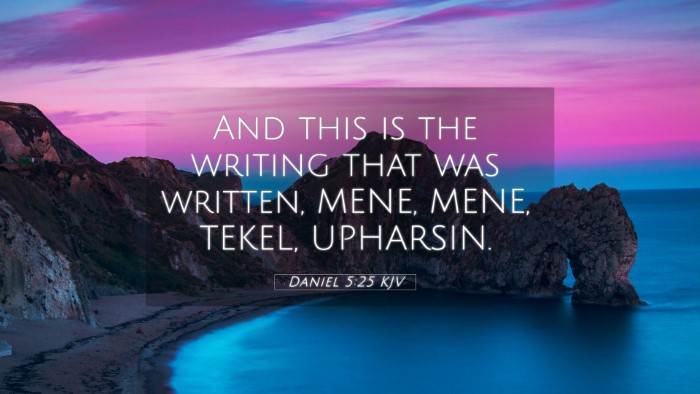Understanding Daniel 5:25
Daniel 5:25 reads: "And this is the writing that was written: MENE, MENE, TEKEL, UPHARSIN." This verse is part of a momentous occasion during the reign of King Belshazzar, interpreted by the prophet Daniel, which carries deep significance in the context of divine judgment.
Verse Analysis and Interpretation
The verse presents a divine message written on the wall during a feast held by King Belshazzar, symbolizing God's imminent judgment upon him and his kingdom. Each term in the passage holds profound implications:
-
MENE: Indicates that God has numbered the days of Belshazzar's kingdom and brought it to an end.
According to Matthew Henry's Commentary, this signifies the limits of time assigned by God and points toward the accountability every ruler has before divine authority.
-
TEKEL: Means "You have been weighed on the scales and found wanting." This highlights the moral and ethical failures of Belshazzar.
Albert Barnes notes that this shows God’s justice in weighing the actions of individuals and nations, representing that spiritual integrity is crucial for a ruler.
-
UPHARSIN: Can be interpreted as "your kingdom is divided and given to the Medes and Persians." This foretells the fall of Belshazzar’s reign.
Adam Clarke explains that this signifies the end of an era and the transfer of power, underscoring that God controls the destinies of nations.
Thematic Connections and Cross-references
Understanding Daniel 5:25 necessitates exploring its connections with other biblical texts. Here are several cross-references that enhance the meaning and provide clarity regarding the judgment and sovereignty of God:
- Isaiah 13:19: "And Babylon, the glory of kingdoms, the splendor and the pomp of the Chaldeans, will be like Sodom and Gomorrah when God overthrew them." This verse reinforces the prophetic assertions of judgment against great nations.
- Jeremiah 51:11: "Sharpen the arrows; take up the shields! The LORD has stirred up the spirit of the kings of the Medes, because his purpose concerning Babylon is to destroy it." This highlights divine orchestration of events in history.
- Proverbs 16:18: "Pride goes before destruction, and a haughty spirit before a fall." This encapsulates the hubris of Belshazzar and the moral implications of leadership.
- Ezekiel 30:10: "Thus says the Lord GOD: I will put an end to the hordes of Egypt by the hand of Nebuchadnezzar king of Babylon." This demonstrates the fate of nations under God's decree.
- Revelation 18:2: "And he called out with a mighty voice, 'Fallen, fallen is Babylon the great! She has become a dwelling place for demons...'" This shows the ultimate destiny of Babylon, echoing the fate foretold in Daniel.
- Luke 14:11: "For everyone who exalts himself will be humbled, and he who humbles himself will be exalted." A New Testament parallel focusing on humility before God.
- Acts 12:21-23: Relates the downfall of King Herod as he accepted the praise of men and was struck down for his arrogance, similar to Belshazzar's actions.
- Romans 14:10: "For we will all stand before the judgment seat of God." Reinforces the principle that all will be accountable to God for their actions.
- 1 Peter 4:5: "But they will give account to him who is ready to judge the living and the dead." This emphasizes God's judgment against all nations and individuals alike.
- Matthew 24:2: Jesus foretells the destruction of the Temple, indicating the end of an age and God's sovereignty over all history.
Conclusion
Daniel 5:25 serves as a powerful reminder of the principles of divine judgment, accountability, and the transient nature of earthly power. Each term contributes to the overarching narrative that God is sovereign over every kingdom, and no one escapes His judgment. Connecting this verse with others through Bible verse cross-references enables a deeper comprehension of God's engagement with humanity throughout scripture.
Tools for Further Study
To enrich your study, consider utilizing resources such as:
- Comprehensive Bible concordance for tracking key terms.
- A Bible cross-reference guide for thematic studies.
- Software tools targeting cross-referencing Bible study methods.
- Bible chain references to explore connections over time.
In summary, the insights from both the Old and New Testament illuminate the significance of Daniel 5:25. As modern readers, it invites reflection on leadership integrity and the sovereignty of God in a world often marked by human pride and downfall.


